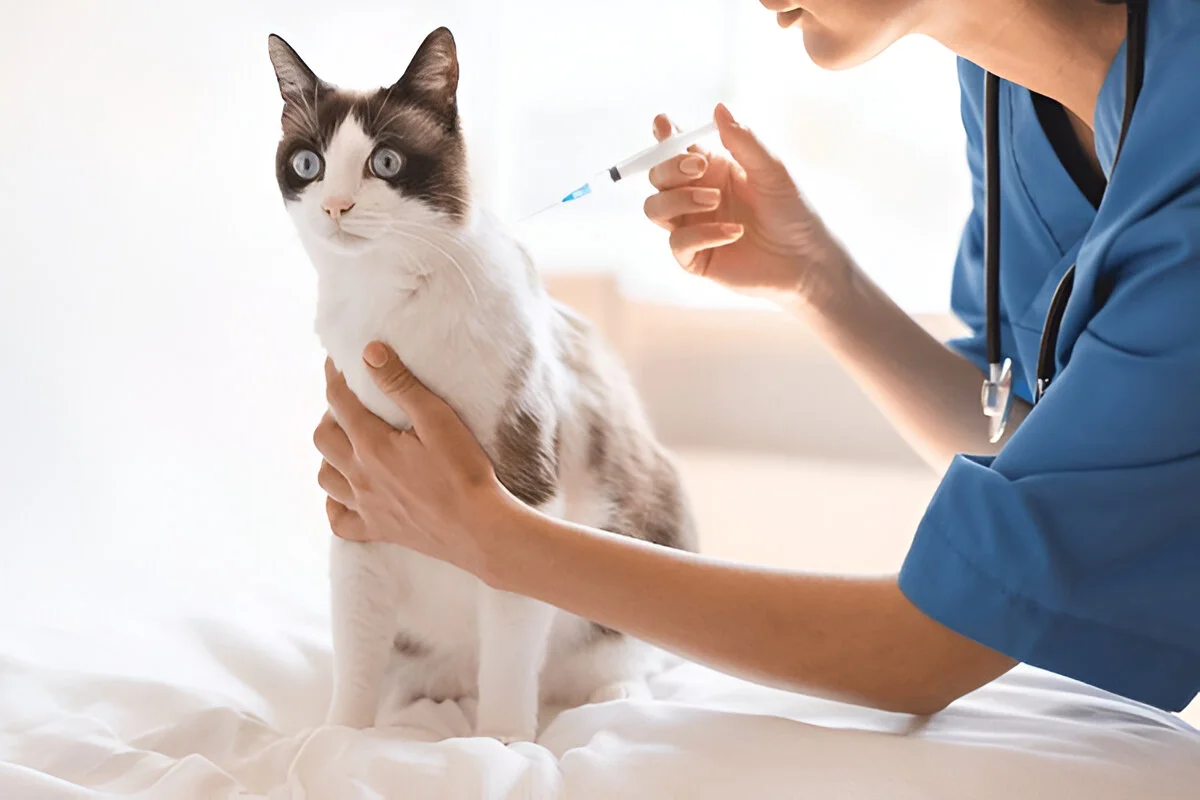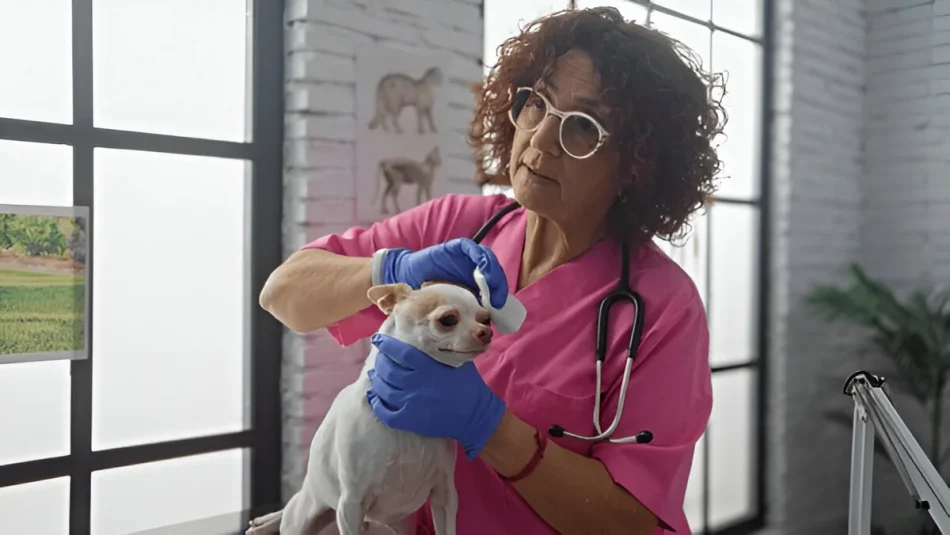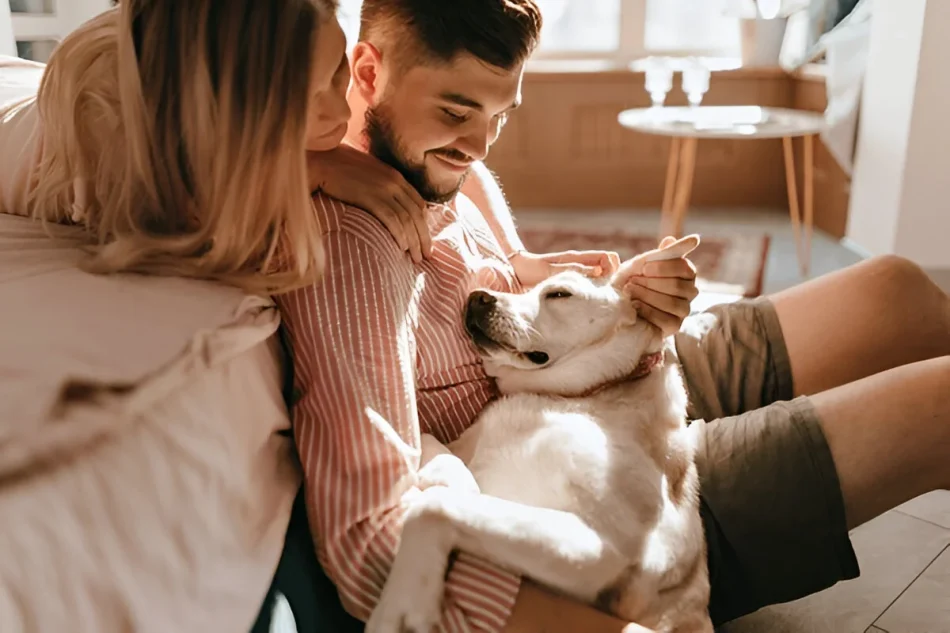
We’ve all heard the saying, “An ounce of prevention is worth a pound of cure.” This is a lifesaving truth for your pet’s health! Vaccination is one of those “precautions” that can ensure your pet stays happy and healthy! It works like armor for your furry friend and shields them against deadly diseases.
However, many neglect its importance. Figures suggest that 45% of U.S. households own a dog. Yet, nearly 40% of them think vaccines for their canine companions are unsafe. Another survey found that 4% of dogs and 12% of cats were not vaccinated against rabies. Plus, vaccination rates for parvovirus and distemper were even lower!
Remember, your pet counts on you, so it’s time for you to become their hero! Vaccinations are essential to ensure your pet’s long-term health and well-being. A precise pet vaccination schedule will be given by your vet, and sticking to it is vital for your pet’s protection.
The sooner you realize its necessity, the better for you and your pet! Stay tuned as we dig deeper to explore why vaccinations are necessary for your pets.
Why Your Pet Needs Vaccination?
Vaccination is more than a reaction to illness. It’s a proactive step to shield your pet from preventable diseases. It’s natural to feel concerned about injecting them, especially when they seem perfectly healthy.
Well, it’s similar to how we vaccinate our kids even though they’re not sick. For instance, puppies are vulnerable. Their immune systems are still developing, making them susceptible to diseases.
This is the reason why early vaccines are non-negotiable. Vaccinated puppies are more likely to develop a strong immune system, enabling them to fight against pathogens(viruses, bacteria, or microorganisms causing disease).
Another common concern for pet parents is, “I take good care of my pet, so why do they still need vaccinations?” Following best hygiene pet practices and giving a caring home won’t alone solve the problem.
Only timely vaccines can protect your pet from life-threatening diseases. Getting your furry pet vaccinated can result in the following:
- Strengthens their immune system by producing antibodies to combat illnesses.
- Protection against diseases that could otherwise result in serious health consequences or even lead to loss of life.
- Prevents pathogens your pet may encounter in the environment or from other animals.
- Improve your pet’s overall quality of life by lowering the likelihood of painful illnesses, allowing them to live a longer, healthier life.
- Safeguards your family, caregivers, and neighbors from diseases that could spread from animals to humans.
- Fewer trips to vet visits and less need for expensive treatments.
- Several states have enforced strict pet vaccination guidelines, mandating vaccines in the interest of public health.
- Owners of reputable pet boarding, daycare, and training facilities require proof of vaccination to safeguard all animals and ensure a healthy environment.
Before we move forward, are you aware about the “The PAW Act” (introduced for making veterinary care more affordable)? If not, we highly recommend checking out our blog on the same topic for more insights.
What Needs to Be Done?
1. Keep Your Vet Closer

There are no universally applicable vaccines for pets. Just like humans, each pet has their own specific requirements. That’s why it’s crucial to consult your veterinarian. They’re the best person to help you understand your pet’s vaccination needs. A veterinarian will create a dedicated pet vaccination schedule by considering various factors.
They will assess your pet’s past vaccination records and pre-existing conditions that could influence the vaccination plan. Remember, each pet is unique. Hence, your vet will recommend a vaccination schedule considering factors such as your pet’s breed, age, activity, activity levels, and exposure risks.
Encourage an open conversation with your veterinarian to ensure the best pet vaccination schedule for your furry friend. Their expert advice ensures optimal protection for your pet without unnecessary treatments.
2. Understanding Types of Vaccinations
Pets vaccination is divided into two categories: Core Vaccines and Non-Core Vaccines.
| Core Vaccines | Non-Core Vaccines |
| Rabies | Bordetella (Kennel Cough) |
| Canine distemper/adenovirus-2 (hepatitis)/parvovirus/parainfluenza vaccine (DA2PP, DHPP, or DAPP) | Leptospirosis |
| FCRVP | Lyme Disease |
| Canine Parainfluenza | |
| Canine Influenza | |
| FELV |
Important Note: Contact your veterinarian for the right guidance on immunization for cats and dogs.
- Core Vaccines: These are essential vaccinations for pets that safeguard them from several infections, including rabies, parvovirus, and distemper, which can be quite dangerous.
Non-Core Vaccines: These vaccines are based on your pet’s lifestyle and the environment they live in. The non-core vaccinations provide protection against diseases that are extremely contagious or could endanger your pet’s life.
3. Special Considerations for Pets

- Age: Early vaccinations are essential for puppies and kittens since their immune systems are developing. Senior pets can have different vaccination requirements depending on their health and immune status.
- Health Issues: Health concerns like chronic diseases, weak immune systems, or vaccination reactions can require special medical attention. Work closely with your veterinarian to ensure your pet gets the right vaccination by explaining the symptoms you’ve noticed.
- Seasonal Changes: Changing weather conditions can expose your pet to new threats. Beyond following the best summer or winter care tips, take suggestions from your vet on vaccinations according to seasonal variations.
Must Read: New Dog and Cat CPR Guidelines: What You Need to Know
4. Post-Vaccination Care & What to Expect

Vaccinations are safe, although your pet can experience slight mild side effects after the shot. This may include:
- Soreness at the injection site
- Lethargy or tiredness
- Slight fever
These side effects normally go away in a short span of time. However, if your pet shows severe symptoms like vomiting, breathing difficulties, or swelling around the face or neck, consult a vet immediately.
Knowing what’s normal and when to seek help ensures your pet stays healthy and comfortable after getting vaccinated. Your vet will provide guidance on monitoring your pet and the signs to watch for after they receive their shots.
How to Stay on Top of Your Pet’s Vaccination Schedule?
With so much information, remembering every vaccination date can be difficult. But we’ve got good news for you! AllTails Care is here to keep you organized and make sure your pet doesn’t miss a single vaccine or vet appointment.
The app keeps you on track, sending timely reminders for vet visits and vaccinations to prevent missed boosters or double doses. Now, no need to worry about your pet’s last vaccination shot or which vaccine is next; organize your pet’s vaccination schedule with the AllTails Care app!
Conclusion
In the end, vaccinating your pet is more than a medical requirement; it is an act of love and duty. Vaccinations are the key to your pet’s long, joyful, and healthy life.
They shield your pet from potential diseases, help them thrive in their daily activities, and keep others around them safe, too. Always consult your vet for pet-specific vaccine instructions. A healthy tomorrow starts with responsible choices today.
So, don’t miss a single vaccine dose! And for stress-free pet care management, download the AllTails Care app. Click on the link given below to download the app!
iOS: https://shorturl.at/rrZw1
Android: https://shorturl.at/VJQoc